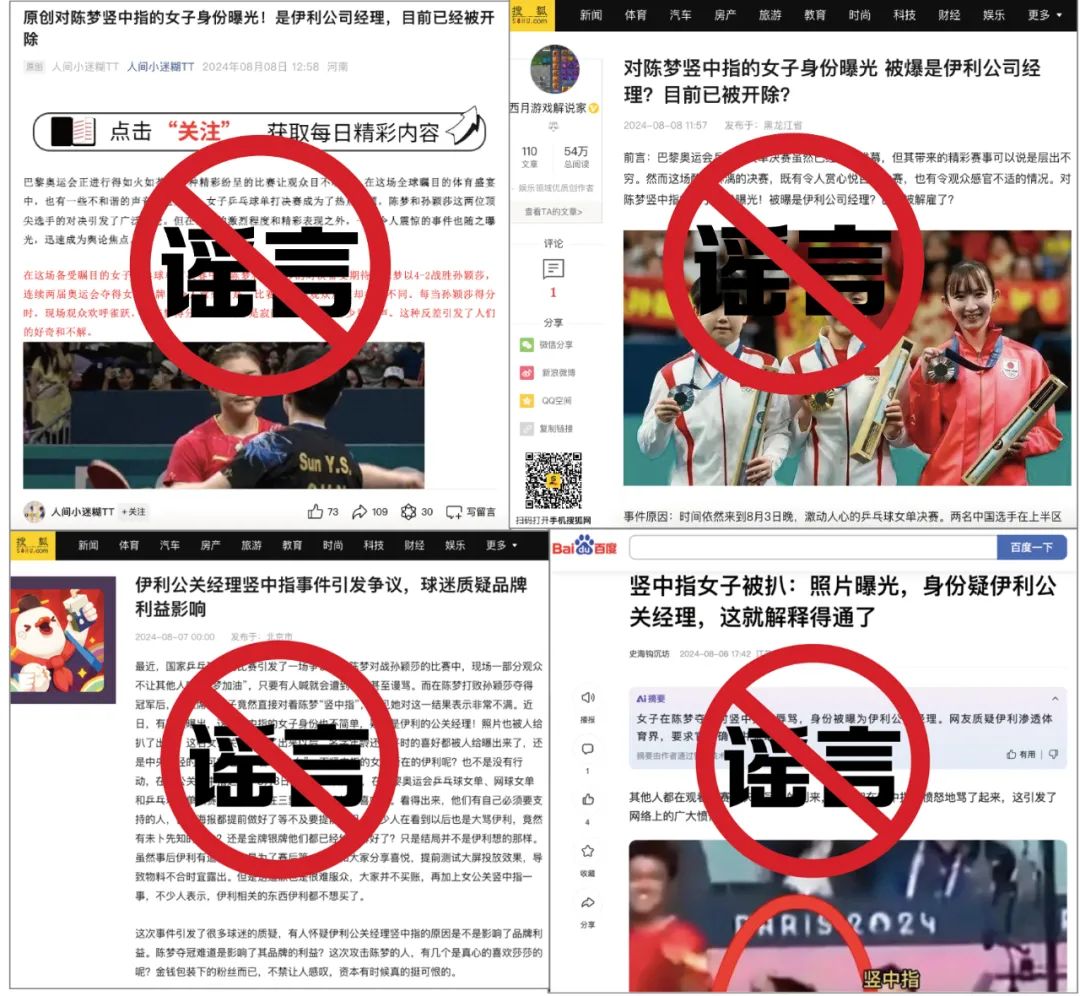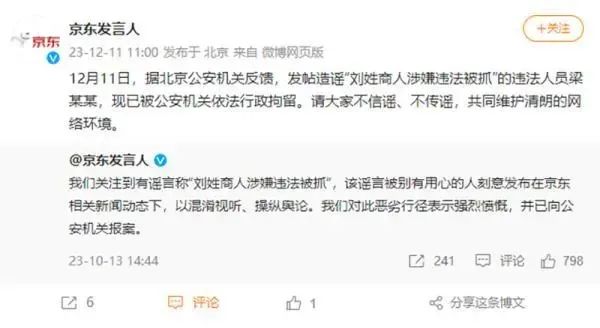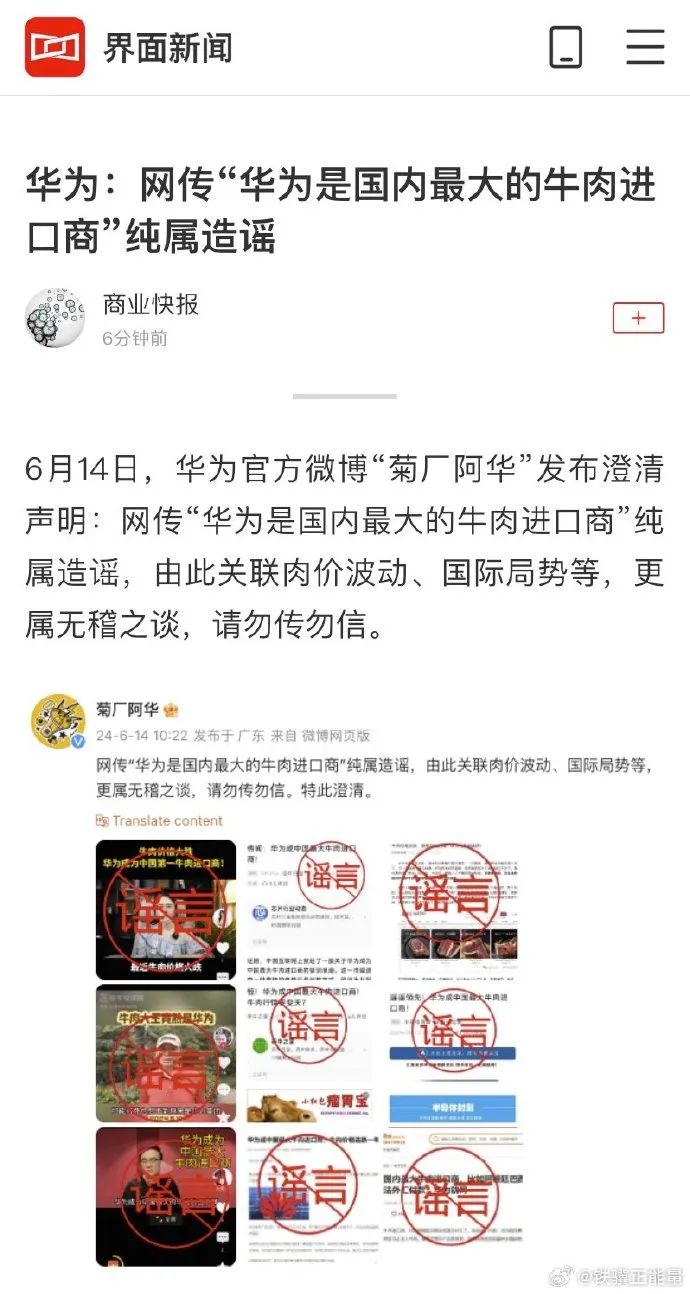Yili, Huawei, and JD.com have all been harmed by it, and NIO has not escaped this disaster
![]() 09/04 2024
09/04 2024
![]() 492
492

Everyone has a microphone
Beware of sinning through one's mouth
Original content from Youdianshu · Digital Economy Studio
Author | Uncle You
WeChat ID | yds_sh
In the era of information explosion, the internet has become one of the main channels for people to obtain information. However, cyberspace is also flooded with various false information and rumors, causing numerous negative impacts on the normal operation of the economy and society. For example, the false information that "NIO has declared bankruptcy" suddenly appeared on the internet recently, directly "rumoring" the company out of existence. Is this consequence serious or not? NIO's Legal Department also immediately issued a statement to clarify and reported it to the police. The internet is not a lawless land, and spreading rumors is illegal. By the time one has to bear legal consequences, it will be too late to regret.


Internet rumors are pervasive, harming individuals, enterprises, and society alike
Internet rumors are often accompanied by low costs and eye-catching characteristics. In the era of information explosion, people crave novel and stimulating content, and rumors just satisfy this demand. They spread rapidly on social media like viruses, attracting attention. The forces behind them often have various motives, such as pursuing clicks, creating topics, attacking competitors, etc., and are willing to fabricate lies.
According to cases disclosed by the Ministry of Public Security, some netizens have spread rumors and pornographic videos about a celebrity "turning to prostitution," maliciously "creating pornographic rumors" to insult and defame the parties concerned. The public security organs found that Nie Moupeng, a self-media practitioner, collected pornographic information to maliciously splice "pornographic rumors" articles and publish them on WeChat official accounts to attract followers and traffic, ultimately leading to the widespread dissemination of this information and causing a very negative impact on the reputation of the parties.
Well-known enterprises are often the targets of online rumors, with serious consequences. Zong Qinghou once said in an interview before his death, "We (Wahaha) don't have many difficulties other than the online rumors that have caused us the most trouble." At that time, he used Wahaha's once most successful single product, Nutri-Express, as an example. Since 2014, rumors have circulated that Nutri-Express can be used as condoms after air-drying. Later, these rumors evolved into claims that drinking it can cause leukemia and that the product was contaminated with botulinum toxin and urgently recalled. According to Wahaha's statistics, these rumors were spread a total of 170 million times, affecting Nutri-Express sales, which could have reached 400 million boxes but only sold 150 million boxes during that period, resulting in a loss equivalent to 20 billion yuan.
Online rumors about product quality undoubtedly damage a brand's social reputation, and some unfounded rumors can also adversely affect a brand's social image. In the women's singles final of the 2024 Paris Olympic Games table tennis event held on August 3, Chinese players won both gold and silver medals. However, during the competition, some irrational spectator behaviors sparked online debates. From the live broadcast footage, some fans made discordant noises during cheers, and some even made insulting gestures. Some netizens claimed that the woman in question was an employee of Yili.

Rumors like "netizens say" and "it is rumored that" emerge without any factual basis. Rumors spread because they combine with hot events and attract people's attention. As the official dairy partner of the Chinese Olympic delegation for the 2024 Olympics, it is reasonable for Yili staff to appear at the Olympic venue. Therefore, netizens lowered their guard against this rumor, and Yili innocently "got caught in the crossfire.
This incident not only damaged Yili's reputation but also involved the international image of Chinese brands. Therefore, Yili promptly reported the case to the police and publicly stated that the party in question was not an employee of the company, demonstrating the company's commitment to safeguarding its own interests and upholding social justice. Subsequently, the netizen who first published the false rumor issued a statement on Weibo, admitting their mistake and apologizing to Yili, finally bringing an end to this incident that had nothing to do with Yili.

This case shows that from a public relations perspective, it is essential for large enterprises to respond quickly and transparently to rumors. Especially in today's era of rapid social media dissemination, any enterprise, regardless of size, can be significantly impacted by a rumor. Yili's timely response and reporting to the police demonstrated its crisis management capabilities and determination, crucial for maintaining its corporate image.
For listed companies, even unsubstantiated rumors can affect their market value. On October 13, 2023, JD.com's Hong Kong-listed shares plunged by over 12% to HK$103.5 per share, hitting a new low since its listing. That noon, the official Weibo account of JD.com issued a statement noting that they had noticed rumors claiming that a "Mr. Liu was arrested for suspected illegal activities." The rumors were deliberately posted under JD.com-related news updates to confuse the public and manipulate public opinion. JD.com expressed strong indignation over this malicious act and reported the matter to the public security organs.

At the social level, after the earthquake in Jishishan County, Linxia Prefecture, Gansu Province, Liu Mouhui, a netizen from Suzhou, Anhui Province, attempted to attract attention by posting a link on Xianyu (a second-hand trading platform) to sell a brand of down jackets, falsely claiming that they were "for sale to aid the earthquake-stricken areas in Gansu, first come, first served." This led to the widespread dissemination of rumors that "down jackets donated to the disaster area were being resold," causing a detrimental impact. The Suzhou public security organs promptly arrested Liu Mouhui, and he was subsequently sentenced to 10 months in prison by the court.


Unfounded "flattery" is also a rumor that can disrupt people's ability to discern the truth
There is another type of rumor that sounds like flattery but has negative consequences. For example, on domestic social media, there have been numerous messages about countries placing orders for Huawei's new 5G phones, such as Saudi Arabia placing a $10 million order and Russia purchasing millions of phones.
However, Huawei officially debunked all these claims later. While it would be great if Huawei phones sold well overseas, these so-called orders seemed very exciting. However, these unfounded rumors can easily lead to adverse consequences. Many of the countries that supposedly "purchased" Huawei phones are either allies actively courted by Western countries or their enemies. Such false information is likely to be screenshot by Western media, leading to unfavorable consequences for Huawei.
Another fake news item, reminiscent of a "cold fact," once circulated on the internet: "Huawei has become China's largest beef importer with an astonishing import volume of 660,000 tons of beef." The tech giant became a leading meat importer, which, like the overseas phone orders, seemed exciting. However, this was also a rumor.
Huawei's official Weibo account issued a clarification stating that the rumor that "Huawei is China's largest beef importer" was pure fabrication, and any associations with fluctuations in beef prices or international situations were also baseless. According to data from China's Ministry of Commerce, China imported approximately 2.772 million tons of beef and beef by-products in 2023, while Huawei imported about 100 tons of beef in 2023, accounting for approximately 0.003% of the country's total imports.

Fabricating such "flattering" rumors often aims to generate traffic by capitalizing on people's interest in Huawei and patriotic sentiments to attract online attention. However, given the recent decline in beef prices, farmers, traders, and related enterprises are all losing money. At this time, if news spreads about Huawei importing large quantities of Argentine beef, what would netizens think? Surely, some would assume that the significant drop in beef prices is related to Huawei's "irrelevance" to its core business.
Therefore, internet rumors not only negatively impact corporate images but also pose a greater harm by mixing truth with falsehoods, causing people to lose their ability to discern the truth. People often act inappropriately due to false rumors, especially when faced with rumors related to their vital interests. In such situations, people lose their rationality and judgment, deeply believing in the rumors. These rumors spread rapidly, ultimately causing widespread panic in society.

A two-pronged approach of rule of law and technology to achieve "zero tolerance" for online rumors
Examining typical cases of rectifying online infringement related to enterprises across regions reveals that most of the enterprises affected by online rumors are private enterprises. Private enterprises contribute to over 80% of urban employment, and their survival and development are not only related to market fairness but also to employment and people's livelihoods, affecting the quality of life of countless ordinary people. If private enterprises are tarnished by online rumors during their development, it will only make private entrepreneurs feel like they are walking on thin ice, ultimately hurting the broad masses of ordinary people.
The internet is not a lawless land, and spreading rumors is illegal, requiring corresponding legal responsibility. According to Article 1194 of the Civil Code of the People's Republic of China, network users and network service providers who infringe upon others' civil rights and interests through the internet shall bear tort liability. Those who spread rumors, falsely report dangerous situations, epidemics, police situations, or deliberately disrupt public order by other means, or publicly insult or fabricate facts to defame others, and whose actions do not constitute a crime, shall be subject to administrative penalties such as detention and fines in accordance with the "Public Security Administration Punishments Law of the People's Republic of China." Those who spread rumors and commit crimes shall be held criminally responsible in accordance with the Criminal Law of the People's Republic of China, with a maximum sentence of seven years in prison for serious consequences.
To stop online rumors, a two-pronged approach of the rule of law and technology is necessary. On the one hand, it is essential to promote the comprehensive rule of law and adopt a "zero tolerance" policy towards online rumors, forming an effective deterrent through legal punishment to ensure the healthy operation of the internet within the framework of the rule of law. On the other hand, emphasis should be placed on the application of new technologies in the field of anti-online rumors. By improving real-name internet registration, building recognition models for online rumors, and strengthening content recognition and early warning measures on relevant platforms, the protection of enterprises and individuals can be enhanced, and the difficulty of evidence collection and rights protection can be reduced.
In the internet age, "everyone has a microphone," but one cannot speak recklessly in cyberspace. Although cyberspace is virtual, the subjects using it are real and must abide by laws and regulations. Purifying the internet environment and combating online rumors require the concerted efforts of all netizens to refrain from believing, spreading, or fabricating rumors, working together to build a clean and bright cyberspace.







